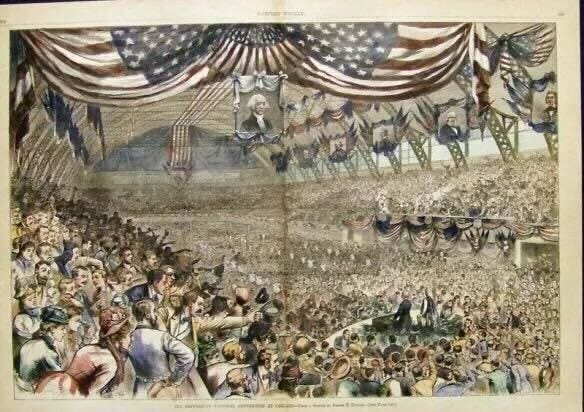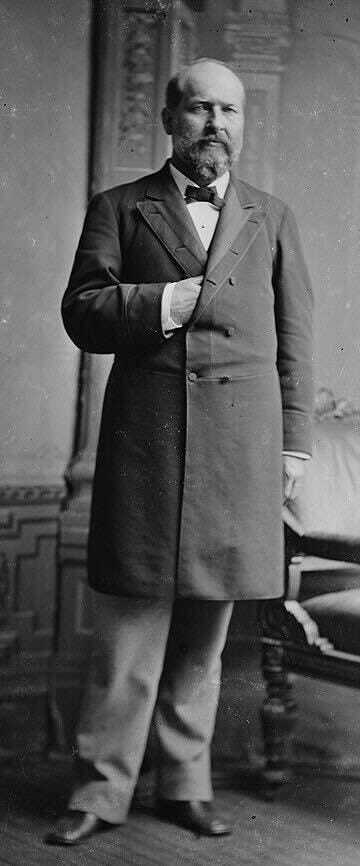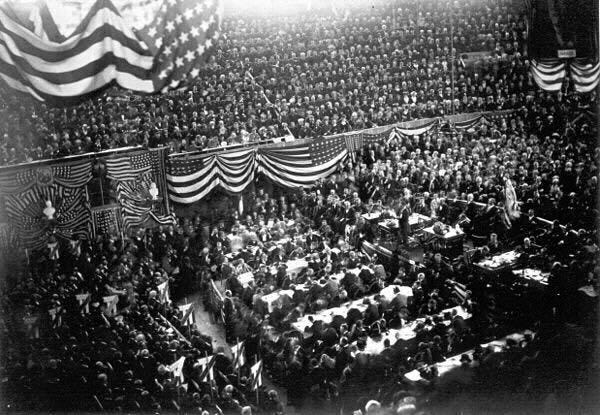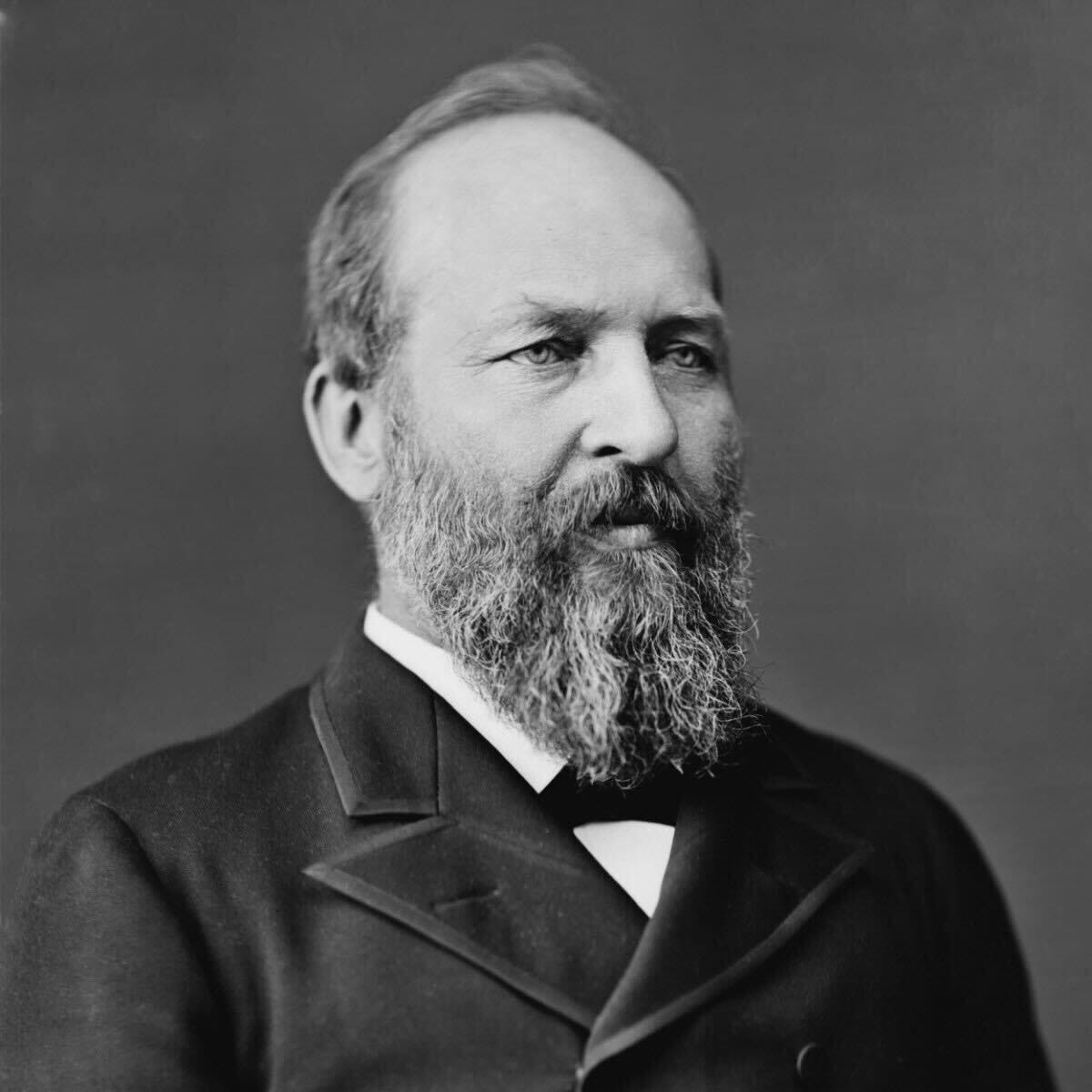The Nominee Who Never Wanted to be President
James Garfield wasn't even a candidate when the Republicans chose him in 1880.
As James Garfield walked to the convention hall, he was filled with a sense of dread.
Garfield was scheduled to nominate fellow Ohioan John Sherman in a speech later that day. But he just couldn’t bring himself to write it.
That year, the Republican party had no clear leader, and Garfield wasn’t entirely convinced that Sherman was the best option.
Incumbent Rutherford B. Hayes was not seeking re-election. Ulysses S. Grant was attempting a comeback after having already been president and leaving office. But because of his previous presidency, Grant had a sizable number of people who did not want to see him take the helm of the United States again.
Republicans had been in power for 10 years, but the party’s fate now looked uncertain.
The morning of his speech, the city was jam-packed with people looking to attend the convention. In fact, it was so busy that a stranger knocked on Garfield's hotel door and asked to share his bed. Like literally, sleep in his bed with him.
Garfield, a kind-hearted man, said yes, later writing home that his “bed is only three quarter size and with a stranger stretched along the wall, I could not get a minute of rest or sleep.”
Exhausted, Garfield dropped into his seat on the convention floor and waited to be called up.
At the time, nominating conventions were contentious affairs. Delegates were picked by party leaders in state and local caucuses, and then sent to the convention, where they would cast ballots for the candidate of their choice.
Each state had a set number of votes and each delegate got one vote for their preferred candidate. The winning nominee had to get 379 votes, and voting went on until someone gained enough to claim victory.
These conventions were filled with backroom deals and delegates working behind the scenes to win votes for their candidate. Candidates, some of whom weren’t even at the convention, waited by their direct telegraph lines (a new invention) as their delegates did whatever they needed to do to convince other delegates to join their side.
But before Garfield was called to speak, New York Senator Roscoe Conkling, one of Grant’s most powerful supporters, gave his nominating speech for the former president. A great speaker, Conkling whipped the crowd into a frenzy, and left the stage to chants of “Grant! Grant! Grant!”
Garfield used this rousing reaction to his advantage, carrying the convention in a different direction. As he stood on the stage, the crowd went silent.
Garfield said, “When your enthusiasm has passed, when the emotions of this hour have subsided, we shall find below the storm and passion that calm level of public opinion from which the thoughts of a mighty people are to be measured, and by which their final action will be determined.”
Garfield was reminding the crowd of delegates who they were there to represent: The people. Who they chose for president mattered. It needed to be the person that the voters would want to represent them in the White House.
Garfield continued, “Not here, in this brilliant circle… is the destiny of the Republic to be decreed for the next four years… but by four millions of Republican firesides, where the thoughtful voters, with wives and children about them, with the calm thoughts inspired by love and home and country, with the history of the past, the hopes of the future, the reverence for the great men who have adorned and blessed our nation in days gone by, burning in their hearts.”
The people before him held their breath, waiting to see what Garfield would say next. He asked simply, “What do we want?”
Unexpectedly, a voice pierced the silence. “We want Garfield!”
James Garfield had just unknowingly convinced everyone there that maybe HE was the right person for the job. But he did not want to be president. I cannot stress enough how badly he did not want to be president. But the tide had started to roll, and there was nothing he could do to stop the surge.
He did try, though. Garfield spoke more about the success the Republicans had seen in recent years, and ended his speech by nominating Sherman. But it was too late. There was now a growing movement to nominate Garfield.
Delegates from all over the country came to ask him to allow his name to be put in for consideration. Garfield fought it at every turn, saying he would be loyal to Sherman and vote for him.
The next day, balloting began. By the end of the day, 28 rounds of balloting resulted in no front runner. A single delegate from Pennsylvania voted for Garfield.
Tensions rose inside the hall. But outside, crowds gathered. Hundreds of men and women were watching and waiting. A reporter said the “buzz increased each minute” in the square where the crowd continued to grow. The voting continued for twelve hours with no result. The convention hall emptied out onto the streets, without choosing a nominee.
The next day, the delegates were weary, and the ballot numbers wouldn’t budge.
But then, on the 34th round of balloting, Garfield got 17 votes: the lone Pennsylvania delegate was joined by 16 delegates from Wisconsin.
Garfield stood up and shouted, “I challenge the correctness of the announcement. The announcement contains votes for me. No man has a right without the consent of the person voted for, to announce that person’s name and vote for him in this convention. Such consent I have not given…” but the convention chairman banged his gavel and told Garfield to sit down.
Like a cloudburst, votes for Garfield started rolling in. Delegates from Indiana and Maryland switched their votes to him. Then Minnesota and North Carolina. Garfield sat stunned. Delegates rushed over and asked him to stand and speak, but Garfield turned them down, saying it wasn’t a “theatrical performance.”
On the 36th ballot, the convention clerk said no candidate had the majority. A journalist wrote of that moment, that the hall quieted, and “instinctively, it was known, perhaps felt would be a better word, that something conclusive was about to be done.”
Connecticut changed their votes, then Georgia, then Illinois. “And then, then the stampede came,” wrote a journalist. Kansas, Kentucky, Iowa, all gave votes to Garfield. Maine delegates abandoned their own congressman and gave all 14 votes to Garfield.
Sherman, who was not at the convention but was being told the news through telegraph messages, sent a message to the convention floor. It read: “Whenever the vote of Ohio will be likely to ensure the nomination for Garfield. I appeal to every delegate to vote for him. Let Ohio be solid. Make the same appeal in my name to… every delegate who has voted for me.”
It was over. Garfield won the nomination with 399 votes. The hall exploded with cheers, so loud the building seemed to tremble. Delegates “lost control” of themselves, a reporter wrote, “many of them cheered like madmen. Others stood upon their seats and waved their hats high above them.”
Garfield asked another Ohio delegate if he could leave (the delegate said he must stay). Garfield was shocked and sickened by the news, softly saying, “Thank you” to delegates as they came to congratulate him.
When a delegate from Maine approached him, Garfield said, “I am very sorry, that this has become necessary.” He then sent a telegram to his wife that read, “Dear Wife. If the result meets your approval, I shall be content. Love to all the household. J.A. Garfield.”
A month later, he wrote that there was a “streak of sadness” in becoming the Republican candidate, “that I suppose no one else can understand.”
When he finally got back to his tiny hotel room, Garfield had over 600 telegrams waiting for him, and the room was filled with people. He looked down, realizing he was somehow holding a “Garfield for President” badge.
********
Conventions today aren’t such raucous affairs. They are mostly events to boost a candidate’s image and to demonstrate their party’s support for them.
Delegates aren’t there to select a candidate. By the time they get to the nominating convention, presidential primaries and caucuses have already been held around the country, and most candidates have withdrawn due to their lack of success, leaving a single man (or woman) standing in each party.
So as you watch the Republican convention this week, think back to the time a man named James Garfield, a man who did not even want to become president, got the nomination and assumed the role.
Maybe it’s time we go back to the competitive nominating convention process? The current primary system does not seem to be yielding the kind of candidates many Americans say they want to vote for.
What do you think? What is the best way to choose political candidates that truly represent the will of the people? I’d love to hear your thoughts in the comments.







The current system is frustrating, when candidates drop out before the majority of states even have a chance to have their primary election. We need an official primary Election Day.
Wish list: national primary election day, popular vote instead of electoral, no super pacs/cap campaign spend, shortened campaign cycle, cap age of candidates, term limits for congress.